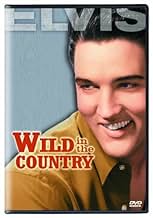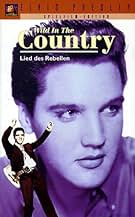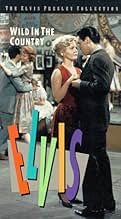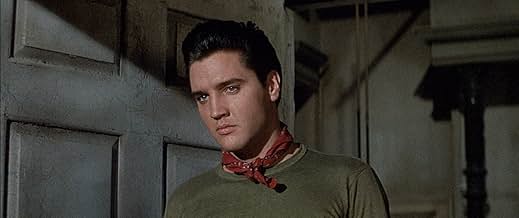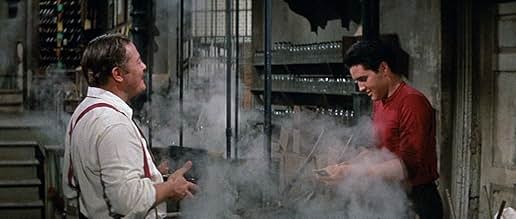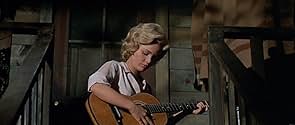VALUTAZIONE IMDb
6,3/10
2201
LA TUA VALUTAZIONE
Aggiungi una trama nella tua linguaA troubled young man discovers that he has a knack for writing when a counselor encourages him to pursue a literary career.A troubled young man discovers that he has a knack for writing when a counselor encourages him to pursue a literary career.A troubled young man discovers that he has a knack for writing when a counselor encourages him to pursue a literary career.
Charles Arnt
- Mr. Parsons
- (non citato nei titoli originali)
Mark Bailey
- Sheriff
- (non citato nei titoli originali)
Walter Baldwin
- Mr. Spangler
- (non citato nei titoli originali)
Joe Butham
- Mr. Dace
- (non citato nei titoli originali)
Pat Buttram
- Mr. Longstreet
- (non citato nei titoli originali)
Harry Carter
- Bartender
- (non citato nei titoli originali)
Linden Chiles
- Doctor
- (non citato nei titoli originali)
Recensioni in evidenza
This film is a tragedy, to me, in that it basically marks the end of Elvis' aspiration to be a 'serious' actor, an aspiration that he was quite capable of realizing. He'd still display flashes of brilliance in his '60s musical comedies, and he yet had the stellar "Follow That Dream" and the somewhat lesser "Kid Galahad" (as well as some late '60s roles) to come, but this film represents his last successful all-out stab at a dramatic role. Elvis plays a country boy, named Glenn Tyler, who's possessed of an enormous talent for writing -- encouraged by his now-dead mother -- but who lacks formal education and the supportive environment needed to allow that talent to bloom. After a series of run-ins with the law, at least some of them undeserved, Glenn is removed to his uncle's custody and it's when he's assigned a female case worker who recognizes his potential that things really begin to change.
Hope Lange plays the proverbial older woman, a fixture of many Elvis movies. Pouty Tuesday Weld plays a prematurely world-weary teenaged mother who represents the fork in Glenn's road that leads to a life less than what he was capable of. Millie Perkins plays the girl from the 'right' side of the tracks whose father looks down on Glenn and his ilk and who represents a path that would take him firmly into the heart of Middle America (southern style). Hope Lange turns out to be the third path, perhaps propelling Glenn to where he might realize his fullest personal potential. Ironically enough, Tuesday Weld played a woman delivered a kidnapped Elvis in 1988's "Heartbreak Hotel" and Millie Perkins played Elvis' mother in the excellent 1990 TV series, "Elvis - The early Years."
Red West, Elvis' former bodyguard and friend since high-school days, plays Elvis' hood/redneck brother in the film. He acquits himself well, though those of us who don't think that anything could justify his participation in the 1977 'tell-a''' book, "Elvis - What Happened?" might perhaps revel in the sound thrashing that Elvis delivers to Red at the film's beginning. Superathlete Rafer Johnson -- fresh from winning an Olympic gold medal for decathlon -- appeared in this film and Christina Crawford made her film debut here. Other familiar faces include Alan Napier (known to many as Alfred, the butler, in the '60s "Batman" series) and Gary Lockwood (Elvis' partner in "It Happened At The World's Fair"). William Mims is great in his role as the sleazy uncle. Jason Robards, father of Junior, made his last screen appearance in this film. For some reason, the film -- though set in the South -- was shot in the Napa Valley region of Northern California.
This film deals with adult themes and it's perhaps not surprising that both Hope Lange and Tuesday Weld featured in "Peyton Place" properties. I understand that the "Peyton Place" franchise defined the modern soap opera, at least the prime-time kind. "Wild In The Country" is, at heart, a bit of a soap opera. I believe that the film was shot with two or three endings -- at least one had a suicide (can't recall if it was Elvis' or Hope Lange's), but they ended up going with the more upbeat conclusion.
In all, I find this film a bit tedious to watch, perhaps explaining why I've only seen it twice now. I don't have a short attention span, but certain movies make me wonder if I'm developing one and this film falls somewhat into that category. As much as anything, perhaps it's a just a little too soapy for me, though a beautifully-realized film packed with convincing characterizations. Still, to me, it pales beside the excellent "Flaming Star." However, I've seen films far more glacial in pacing and many are lauded as 'art' -- to me they're just boring -- and this one, at least, has Elvis! And, to be fair, it tells a good story and does so in a well-crafted way. The songs separate this one from "Flaming Star," too, though few in number and every one is worked into the script naturally. Two of the songs cut from the film are as perfectly beautiful as the ballad that Elvis sings to Tuesday and were recorded in two versions, one with guitar only (for the film) and the other with added instrumentation and voices. The producers, at least, were trying to get away from the typical 'unrealistic' musical thing wherein music and voices come from nowhere.
In this film Elvis again proved his tremendous potential as an actor, and is totally believable for most of his screen time (he does a great 'drunk' scene with Tuesday Weld, too). The film may not be as solid and tight as "Flaming Star" but Elvis' performance is still very strong and he is again ably supported by an excellent cast. It's nothing short of tragic that Elvis' acting ability would never again be explored to the extent that it was in this and the other 1960 Fox film that Elvis did, "Flaming Star." By the time that Elvis finished the '60s and got around to filming some atypical movies (e.g., "Charro!," "The Trouble With Girls," and "Change Of Habit") the damage was already done and the films were subverted either by substandard scripting or by Elvis' own lack of enthusiasm for what had become, over the preceding seven years or so, increasingly a despised exercise in commercialism. Unfortunately, "Wild In The Country" failed to even live up to the mild box-office reception that "Flaming Star" had generated, and we'll never know how things might have turned out differently had Elvis continued to make high-quality dramas (comedies and adventure yarns, for that matter) instead of the lightweight musical 'vehicles' that largely became the norm. About four months after filming "Wild In The Country" Elvis began work on "Blue Hawaii," quickly to become his most successful film of the 33 that he made, and the rest is history.
Hope Lange plays the proverbial older woman, a fixture of many Elvis movies. Pouty Tuesday Weld plays a prematurely world-weary teenaged mother who represents the fork in Glenn's road that leads to a life less than what he was capable of. Millie Perkins plays the girl from the 'right' side of the tracks whose father looks down on Glenn and his ilk and who represents a path that would take him firmly into the heart of Middle America (southern style). Hope Lange turns out to be the third path, perhaps propelling Glenn to where he might realize his fullest personal potential. Ironically enough, Tuesday Weld played a woman delivered a kidnapped Elvis in 1988's "Heartbreak Hotel" and Millie Perkins played Elvis' mother in the excellent 1990 TV series, "Elvis - The early Years."
Red West, Elvis' former bodyguard and friend since high-school days, plays Elvis' hood/redneck brother in the film. He acquits himself well, though those of us who don't think that anything could justify his participation in the 1977 'tell-a''' book, "Elvis - What Happened?" might perhaps revel in the sound thrashing that Elvis delivers to Red at the film's beginning. Superathlete Rafer Johnson -- fresh from winning an Olympic gold medal for decathlon -- appeared in this film and Christina Crawford made her film debut here. Other familiar faces include Alan Napier (known to many as Alfred, the butler, in the '60s "Batman" series) and Gary Lockwood (Elvis' partner in "It Happened At The World's Fair"). William Mims is great in his role as the sleazy uncle. Jason Robards, father of Junior, made his last screen appearance in this film. For some reason, the film -- though set in the South -- was shot in the Napa Valley region of Northern California.
This film deals with adult themes and it's perhaps not surprising that both Hope Lange and Tuesday Weld featured in "Peyton Place" properties. I understand that the "Peyton Place" franchise defined the modern soap opera, at least the prime-time kind. "Wild In The Country" is, at heart, a bit of a soap opera. I believe that the film was shot with two or three endings -- at least one had a suicide (can't recall if it was Elvis' or Hope Lange's), but they ended up going with the more upbeat conclusion.
In all, I find this film a bit tedious to watch, perhaps explaining why I've only seen it twice now. I don't have a short attention span, but certain movies make me wonder if I'm developing one and this film falls somewhat into that category. As much as anything, perhaps it's a just a little too soapy for me, though a beautifully-realized film packed with convincing characterizations. Still, to me, it pales beside the excellent "Flaming Star." However, I've seen films far more glacial in pacing and many are lauded as 'art' -- to me they're just boring -- and this one, at least, has Elvis! And, to be fair, it tells a good story and does so in a well-crafted way. The songs separate this one from "Flaming Star," too, though few in number and every one is worked into the script naturally. Two of the songs cut from the film are as perfectly beautiful as the ballad that Elvis sings to Tuesday and were recorded in two versions, one with guitar only (for the film) and the other with added instrumentation and voices. The producers, at least, were trying to get away from the typical 'unrealistic' musical thing wherein music and voices come from nowhere.
In this film Elvis again proved his tremendous potential as an actor, and is totally believable for most of his screen time (he does a great 'drunk' scene with Tuesday Weld, too). The film may not be as solid and tight as "Flaming Star" but Elvis' performance is still very strong and he is again ably supported by an excellent cast. It's nothing short of tragic that Elvis' acting ability would never again be explored to the extent that it was in this and the other 1960 Fox film that Elvis did, "Flaming Star." By the time that Elvis finished the '60s and got around to filming some atypical movies (e.g., "Charro!," "The Trouble With Girls," and "Change Of Habit") the damage was already done and the films were subverted either by substandard scripting or by Elvis' own lack of enthusiasm for what had become, over the preceding seven years or so, increasingly a despised exercise in commercialism. Unfortunately, "Wild In The Country" failed to even live up to the mild box-office reception that "Flaming Star" had generated, and we'll never know how things might have turned out differently had Elvis continued to make high-quality dramas (comedies and adventure yarns, for that matter) instead of the lightweight musical 'vehicles' that largely became the norm. About four months after filming "Wild In The Country" Elvis began work on "Blue Hawaii," quickly to become his most successful film of the 33 that he made, and the rest is history.
Wild in the Country is a solid film and one of Presley's best.
Elvis is excellent as a delinquent who happens to be a potentially terrific writer. Psychiatrist Hope Lange helps Elvis achieve his potential and they slowly fall for each other. Elvis only sings a couple of songs here and therefore, instead of a musical, we get a dramatic story that's well acted by all three leads and is genuinely captivating, only falls short towards the end and goes for a sappy conclusion. Overall, one of Presley's best films and he once again proves what a great actor he could have been. 7 out of 10.
Elvis is excellent as a delinquent who happens to be a potentially terrific writer. Psychiatrist Hope Lange helps Elvis achieve his potential and they slowly fall for each other. Elvis only sings a couple of songs here and therefore, instead of a musical, we get a dramatic story that's well acted by all three leads and is genuinely captivating, only falls short towards the end and goes for a sappy conclusion. Overall, one of Presley's best films and he once again proves what a great actor he could have been. 7 out of 10.
Apparently Elvis didn't think much of any of his films. According to "Being Elvis", a recent biography by Ray Connolly, Elvis hated the repetitive nature of the plots - same story different location. He felt he had never been given serious roles where he could show what he could do as an actor - he certainly didn't have to compete with Paul Newman and Steve McQueen for the roles in "Fun in Acapulco" and "Girls, Girls, Girls".
Although he definitely had a point about the films toward the end of his Hollywood career, a number of his earlier films were actually based on novels -"King Creole", "Follow That Dream", "Flaming Star" and this one, "Wild in the Country" - stories that had more substance going in.
"Wild in the Country" has elements we expect from an Elvis picture, but then it gets complicated. This was made a few years after James Dean and Sal Mineo had shown that troubled teens were now a fact of life. Elvis plays Glenn Tyler, one of the troubled. After being placed on probation for injuring his brother in a fight, he receives counselling from psychologist, Irene Sperry (Hope Lange).
The not inconsiderable charms of Millie Perkins and Tuesday Weld can't compete when Irene discovers that Glenn has a talent for writing and Glenn discovers that he has feelings for the older woman. In reality, Hope Lange was only two years older than 26 year-old Elvis.
The film has a script by Clifford Odets, although one suspects he would not have considered "Wild in the Country" as his finest hour. He originally had Irene Sperry's character committing suicide at the end, it was changed, but it possibly reflected how Odets felt about selling out to Hollywood.
However the film has a lot going on with well-defined characters and great locations in the Napa valley. If Elvis felt that most of his films only had stories to separate the songs, that was not the case in "Wild in the Country", there are a few songs, but the film is mainly the drama he craved.
I find a lot of his films are fun to watch in the same way as "Beach Party" movies are. But there are a handful of films that have a depth he may not have appreciated at the time - "Wild in the Country" is one of them.
Although he definitely had a point about the films toward the end of his Hollywood career, a number of his earlier films were actually based on novels -"King Creole", "Follow That Dream", "Flaming Star" and this one, "Wild in the Country" - stories that had more substance going in.
"Wild in the Country" has elements we expect from an Elvis picture, but then it gets complicated. This was made a few years after James Dean and Sal Mineo had shown that troubled teens were now a fact of life. Elvis plays Glenn Tyler, one of the troubled. After being placed on probation for injuring his brother in a fight, he receives counselling from psychologist, Irene Sperry (Hope Lange).
The not inconsiderable charms of Millie Perkins and Tuesday Weld can't compete when Irene discovers that Glenn has a talent for writing and Glenn discovers that he has feelings for the older woman. In reality, Hope Lange was only two years older than 26 year-old Elvis.
The film has a script by Clifford Odets, although one suspects he would not have considered "Wild in the Country" as his finest hour. He originally had Irene Sperry's character committing suicide at the end, it was changed, but it possibly reflected how Odets felt about selling out to Hollywood.
However the film has a lot going on with well-defined characters and great locations in the Napa valley. If Elvis felt that most of his films only had stories to separate the songs, that was not the case in "Wild in the Country", there are a few songs, but the film is mainly the drama he craved.
I find a lot of his films are fun to watch in the same way as "Beach Party" movies are. But there are a handful of films that have a depth he may not have appreciated at the time - "Wild in the Country" is one of them.
J.R. Salamanca's book "The Lost Country", adapted for the screen by Clifford Odets (!), becomes decent though somewhat stodgy melodrama featuring Elvis Presley as southern delinquent who shows promise as a writer, counseled by a female psychologist who believes in him. Critics at the time were calling for Elvis to start doing some decent dramatic work, yet when this picture was released it was mostly ignored (it is often cited as the one Presley-vehicle which failed to turn a profit). The females in the cast (Hope Lange, Tuesday Weld and Millie Perkins) are strong screen-matches for Elvis, and the plotting is good when it isn't being overripe. As for the star, he does his typical thing: singing just a few songs, but performing in his usual shy and self-conscious, overly-polite low key. **1/2 from ****
10emdragon
Funny thing. My local video store had this movie listed under "musicals". If there is one thing this picture is NOT, is a musical. It is the one valid dramatic effort of Elvis' career, and easily the best picture he ever starred in. He sings exactly two musical numbers, both are fairly natural in sequences in the film. The first one early in the film while riding with sweetheart Millie Perkins (as Billie Lee) in a pickup truck. . . Is a bit musical-ISH, if you will, in that it sort of comes out of a stylization contrivance of the film-makers. Yet it is very romantic and sweet. The other one is a serenade to Tuesday Weld (Noreen in the movie) that is very comfortably meshed in with this heartfelt story. Anyway, Elvis plays a young man, Glenn, who comes from a troubled past, evolving from country roots that were wild and unsettled between his father and mother. His father was a lazy good for nothing. His mother, who died in his childhood, is depicted as having been a good hearted woman. So Glenn gets in trouble with the law when he nearly kills his brother in a fight. His father wants him to go to jail, but a compassionate parole board, advised by psychiatrist Irene Sperry (Hope Lange) allows him one more chance with his uncle, where he helps with his uncle's distillery. His uncle has a daughter, Noreen, who has a child but no husband,(wonderfully played by Tuesday Weld) who is kind of wild like Glenn (but also tender hearted). In a complicated plot Glenn has both Noreen and Billie Lee to consider. Millie Perkins, as Billie Lee, is also quite inspiring and sweet. Eventually, as Glenn gets in more and more trouble, he ends up falling for the psychiatrist widow Sperry, and at that point he has more women troubles than any man SHOULD have. . . .BUT. . .it's all good. He gets discovered by the psychiatrist for his natural talent, WRITING! Believe me, the troubles this guy has. . . All of us guys would like to be burdened with. Some of the beautiful scenery from the Smokey mountains in Tennessee is quite stunning. Also, I really enjoyed the natural quality that can never be found nowadays in period pieces from the same era (1961). The cars are distinctly authentic, for instance, not all pristine conditioned masterpieces. I give this movie all 10 stars just from the sweet effort given by cast and film makers to NOT make just another money making Elvis vehicle, but a compassionate dramatic tale of moral strength and sweetness.
Lo sapevi?
- QuizElvis Presley's best performances are invariably cited as his three forays into drama, which were natural matches for his chief acting characteristics: petulance, intensity and hidden vulnerability. Not coincidentally, music takes a back seat in most of these three vehicles. In King Creole (1958), based on the plot about a would-be singer, Presley sings a full score of songs. In Flaming Star (1960), there is just one song in the plot. In Wild in the Country (1961), there is only one 'serenade' per female character. The songs were included largely so that, at the very least, an Extended Play soundtrack album could be released for each film and record sales would not be negatively impacted by the time the dramas took to film. King Creole, of course, was one of the best selling albums of Presley's career, but in the case of both Flaming Star and Wild in the Country, no soundtrack album was released outside of a 45rpm single.
- BlooperIn the Elvis drunk scene, when he douses the window with the water hose, the in-between close up shot of the window pane (showing close up the women inside looking out) has no water residue / dripping: next shot back out to Elvis' stance (still water hose spraying) and it's (rightly) soaked.
- Citazioni
Betty Lee Parsons: I have no intention of wasting sympathy on him.
Glenn Tyler: Sympathy is never wasted, Betty Lee. One way or another, you get it back, or so it says in the Book.
- ConnessioniFeatured in Elvis in the Movies (1990)
- Colonne sonoreWild in the Country
by Hugo Peretti, Luigi Creatore and George David Weiss (as George Weiss)
Performed by Elvis Presley (uncredited)
I più visti
Accedi per valutare e creare un elenco di titoli salvati per ottenere consigli personalizzati
- How long is Wild in the Country?Powered by Alexa
Dettagli
- Tempo di esecuzione1 ora 54 minuti
- Colore
- Mix di suoni
- Proporzioni
- 2.35 : 1
Contribuisci a questa pagina
Suggerisci una modifica o aggiungi i contenuti mancanti

Divario superiore
By what name was Paese selvaggio (1961) officially released in India in English?
Rispondi


